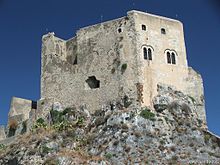This article includes a list of general references, but it lacks sufficient corresponding inline citations. (November 2017) |
Macalda di Scaletta | |
|---|---|
| Baroness of Ficarra | |
 Macalda (right) and Alaimo (center) | |
| Coat of arms |  |
| Born | circa 1240 Castle of Scaletta |
| Died | after October 14, 1308? Castle Matagrifone, Messina |
| Noble family | Lentini |
| Spouse(s) |
|
| Issue |
|
| Father | Giovanni di Scaletta |
| Mother | a noblewoman of the Cottone family |
| Occupation | Countess consort of Buccheri, Butera, Odogrillo, and Palazzolo Acreide |

Macalda di Scaletta (or Machalda; c. 1240 in Scaletta Zanclea – after October 14, 1308? in Messina) was a Sicilian baroness and lady-in-waiting during the Angevin and Aragonese periods. The daughter of Giovanni di Scaletta and a Sicilian noblewoman, Macalda was noted for her political conduct, inclination to betray marriage (political and human), and for her promiscuous sexual habits; because of this dissoluteness, even having a brush with "suspicion of incest," tended to morph into an "exhibitionism veined with nymphomania."[citation needed] She was the wife of the Grand Justiciar of the Kingdom of Sicily, Alaimo da Lentini.
Reportedly ambitious, judicious, and educated in matters of the military, Macalda deployed her influence first in the circle of Charles of Anjou and then at the court of Peter III of Aragon, whom, according to a chronicler of the time[who?], Macalda tried to seduce, but without success. She lived in a time of[when?] upheavals in the Kingdom of Sicily, which were marked by the bloody revolt of the Sicilian Vespers, and which led to the change from Angevin to Aragonese rule.
Practicing intrigue at court, but also vying with Queen Constance of Hohenstaufen[how?], Macalda had a role in at first favoring, and then toppling, the political fortunes of her second husband, the Alaimo da Lentini, who had been one of the major champions of the Sicilian Vespers.
Macalda's career has left behind a recognizable historical trace, though variously treated in the chronicles of her time. One of these, the Historia Sicula by the contemporaneous Messinese chronicler Bartholomaeus of Neocastro, is aggressive towards her character[how?], but some suspect that the political motives influencing the pro-Aragonese Neocastro may not have been the only factor in his bitterness towards Macalda, and that he was "one of the victims of the woman's spell."[citation needed]
Besides her military education, Macalda is also noted for her ability to play chess, which was unusual for a woman of her time, and historical evidence suggests that she was probably the first person in Sicily who learned how to play it.[1]
Her singular figure, inhabiting the pages of chronicle and history, is transfigured in the collective memory, in folklore, and in the collective imagination. Macalda became the protagonist of popular traditions, myths, and legends of Sicily, such as one in Catania about the well of Gammazita.
A distant echo of Macalda's passion for the Aragonese sovereign, which the chronicler Neocastro disseminated in caustic tones, also seems to reverberate in Boccaccio's storytelling, with an enormous difference of tones and accents, in a much more idealized and rarefied courtly and knightly context in the Decameron: the tale of Lisa Puccini's love for King Peter of Raona (Aragon).
- ^ Taylor, Paco (November 26, 2020). "Beyond the Pale: In Defense of Ariana Grande's Astoundingly Dark Tan". Medium.